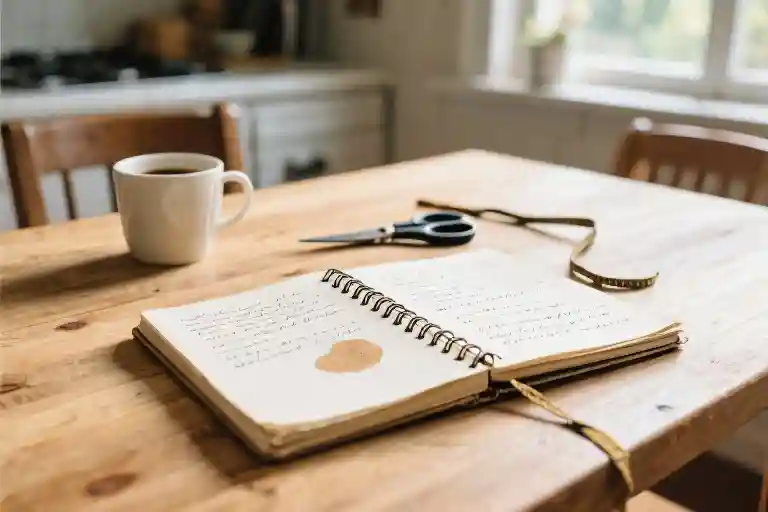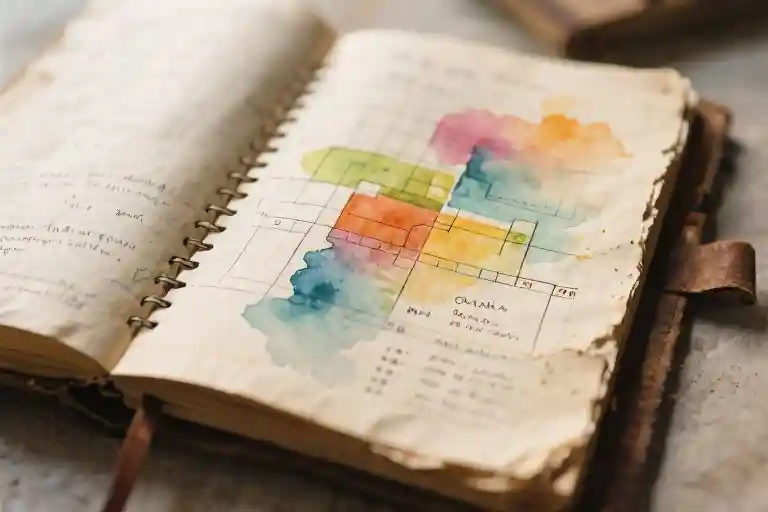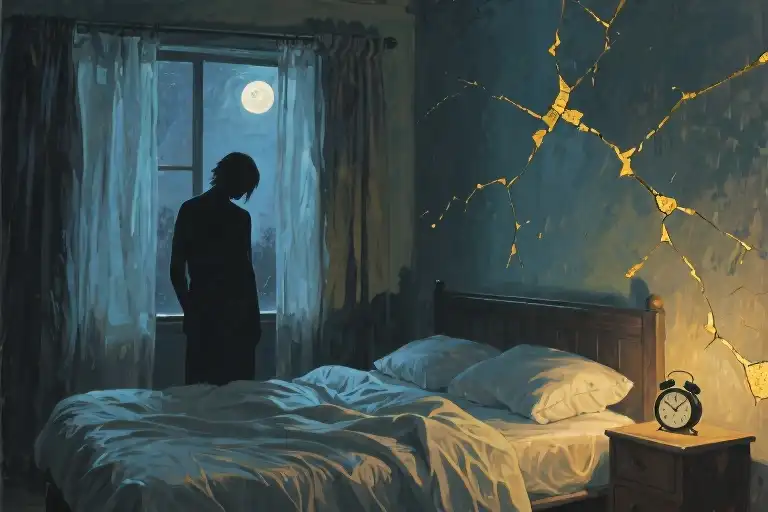The phone screen lit up at 3:17 AM with an email notification from HR. I clutched the sweat-drenched pillowcase—this would be how unemployment and perimenopause chose to introduce themselves. On the nightstand, my teacher ID card stared back at me, the lanyard still coiled like a sleeping snake. With kitchen scissors, I snipped the plastic holder in two clean cuts. The sound was quieter than I’d imagined.
Writing became my compass when all other landmarks disappeared.
That summer taught me how many identities one woman carries without realizing it—educator, employee, reliable morning person. When those labels peeled away, what remained felt frighteningly light. My son’s innocent “What do you do at your new job, Mom?” hung in the air like chalk dust after an erased blackboard. My body, meanwhile, conducted its own mutiny with hot flashes that arrived as punctually as my old classroom bells used to.
Three things kept reappearing in those sleepless nights:
- The HR director’s voice saying “strategic pivot”
- The smell of whiteboard markers I’d never use again
- Stephen King’s underlined sentence in my college copy of On Writing: “To know, I have to write”
It took fourteen showers (the steam helping with the joint pain) before I understood why that particular quote resonated. The man wasn’t offering writing advice—he was describing survival. When the world stops making sense, your hands must move before your brain can follow. So I began with 200 words each morning, no topic restrictions, no spellcheck. Just a cheap spiral notebook and the determination to outlast the day’s first hot flash.
What we call ‘writer’s block’ is often just life’s volume turned too high.
The early entries were embarrassing. Ramblings about lost dental insurance, rage at my favorite pen running dry, one particularly melodramatic ode to the last apple in the fridge. But somewhere around page six, between a grocery list and a half-formed haiku, I found an unexpected clarity. The words weren’t pretty, but they were mine. For twenty minutes each dawn, I wasn’t a failed professional or hormonal mess—just a woman at a kitchen table, listening to her own mind.
Perimenopause had made everything feel like static, but writing became the tuning dial. Some days it only brought the station into slightly less fuzzy reception. Other mornings, entire sentences arrived with crystalline precision, as if my younger self had mailed them forward through time. I began recognizing my voice again—not the polished conference-presentation version, but the messy, curious one that used to fill journals with questions about everything from lesson plans to the meaning of middle school cafeteria hierarchies.
That severed ID card still lives in my desk drawer. I keep it beside the now-completed seventh notebook. One represents an ending I didn’t choose; the other, a beginning I nearly missed. Between them lies the lesson I wish someone had told me earlier: When the world strips away your titles, the blank page becomes the one place you can’t be fired from.
When All the Labels Fell Off
The metal key felt heavier than it should when I dropped it into the administrator’s palm. For twelve years, that key had opened classrooms where I shaped lessons and occasionally, young minds. Now it opened nothing. The weight surprised me – not the physical heft of the brass, but the sudden absence of purpose in my pocket where it used to jingle against loose change.
Three days later, my daughter traced the outline of my empty keychain during breakfast. “So Mommy doesn’t go to school anymore?” she asked, syrup dripping onto the Formica table. I watched the sticky puddle spread while searching for an answer that wouldn’t taste like failure. The truth was I didn’t know what to call myself now. Teacher? Unemployed? Stay-at-home-mom? None of the labels fit right.
My body seemed equally confused. During video interviews, I’d feel the heat rising before seeing the flushed reflection in my laptop screen. One particularly cruel afternoon, a bead of sweat dropped onto the printed resume in my lap, blurring the “Education” header into a Rorschach blot. I stared at the ink spreading across my credentials and understood, suddenly, why they call them hot flashes – not because of the temperature, but because everything important gets momentarily erased.
Perimenopause became the uninvited houseguest who rearranged my furniture. Sleep fled. Temper shortened. The mirror showed a woman who looked tired in a way coffee couldn’t fix. I’d built a career helping others navigate transitions, yet found myself utterly lost in my own. The classroom had given me structure – bells dividing the day into manageable chunks, lesson plans providing predictable rhythms. Now time stretched before me, formless and intimidating.
Some mornings I’d stand in the shower until the water ran cold, rehearsing answers to questions nobody asked. “What do you do?” “Oh, I’m between opportunities.” The steam would fog the glass door where I’d absently trace letters that evaporated before forming words. The irony wasn’t lost on me – a writing teacher who’d stopped writing, an educator who couldn’t articulate her own worth.
At school pick-up, other parents discussed promotions and projects while I calculated how long our savings might last. Their conversations became a foreign language where I’d forgotten basic vocabulary. I’d nod along, smiling through the mental math of mortgage payments versus grocery bills, my body alternately freezing and burning as hormones conducted their invisible rebellion.
The strangest part wasn’t losing the job, but losing the story I’d told about myself. Without the framework of a classroom, I kept reaching for a version of me that no longer existed. Like trying to wear clothes from a decade ago, the shape was all wrong. The labels had fallen off, and I wasn’t sure what container they’d belonged to in the first place.
That summer, I learned identity isn’t a fixed point but a series of adjustments – tiny course corrections made while navigating fog. Some days the fog was literal (thank you, night sweats), other days metaphorical. Always, there was this sense of being slightly untethered, like a boat knocking against the dock when the rope’s too loose.
What nobody mentions about losing your professional identity is how physical it feels. The hollow behind your ribs when you pass the old workplace. The way your hands hang differently without papers to grade. The muscle memory of reaching for a lanyard that isn’t there. My body kept remembering what my mind wanted to forget.
By August, the school supplies section at Target became a minefield. I’d catch myself comparing binder thickness before remembering I had no lessons to organize. One particularly brutal afternoon, I stood frozen in the pencil aisle, assaulted by the scent of fresh wood and erasers, realizing I couldn’t name what I was anymore. The fluorescent lights buzzed overhead as cashiers chatted about back-to-school sales, their voices mixing with the AC’s hum into a dissonant soundtrack for my unraveling.
That’s when I understood: grief doesn’t only visit when someone dies. Sometimes it comes for the lives we thought we’d have, the versions of ourselves we expected to become. And like any good teacher, it gives pop quizzes when we least feel prepared.
When Stephen King Whispered to My Forgotten Self
The book fell open to page 128 as if guided by some unseen hand—there, underlined in my own faded blue ink from fifteen years ago, sat the sentence: “To know, I have to write.” My fingers trembled against the yellowed pages of On Writing, not from perimenopausal hot flashes this time, but from the electric jolt of recognition. This wasn’t just writing advice. It was a lifeline thrown across the chasm of my unemployment, my hormonal chaos, my crumbling sense of purpose.
The irony wasn’t lost on me—a former English teacher who hadn’t written a personal sentence in years. I flipped to the back cover where my graduate school signature smirked at me, the loops of my youthful handwriting so much bolder than the woman holding the book now. Beneath it lay my 2005 Moleskine, its pages filled with terrible poetry and brilliant ideas that never grew up. The contrast between those inky explosions and my current blank documents felt like walking past a childhood home where someone else now lives.
Research suggests women abandon creative pursuits at precisely my life stage—between career peaks and parenting demands—with the average female writer experiencing a 7.3-year ‘silencing period’ (Journal of Narrative Psychology, 2021). We don’t stop having words. We stop believing our words deserve space. That study floated through my mind as I stared at King’s underlined quote, realizing my unemployment wasn’t just costing me a paycheck—it had stolen the last remaining identity I hadn’t yet questioned: the quiet certainty that I was someone who thinks through writing.
Here’s what no one tells you about creative drought: The longer you go without creating, the more your brain convinces you never could. My own hiatus began with logical excuses—grading papers took priority, then parenting, then climbing the ed-tech ladder. But somewhere along the way, I’d internalized the lie that writing was a luxury for people with tidy lives and silent hormones. King’s dog-eared page confronted that lie with brutal simplicity: writing isn’t about having things figured out. It’s how we get there.
That night, I opened a document titled “UNSENT LETTERS TO MY LOST JOBS.” The first sentence came out misshapen, awkward—like trying to walk after years in a wheelchair. But by the third paragraph, something unexpected happened. The words began carrying traces of my twenty-five-year-old self, the one who believed writing could solve anything. She whispered through the clumsy sentences: You’ve always known how to do this. You just forgot the doing was the knowing.
Perhaps this is what midlife reinvention really looks like—not some grand career pivot or enlightened transformation, but the quiet rediscovery of tools we abandoned in youth. For me, it was a battered copy of King’s manifesto and the courage to write badly until the words remembered their way home. The page won’t judge your hormonal mood swings or expired job title. It only asks one question, the same one staring at me from page 128: What happens if you let the writing tell you who you are now?
The Messy Birth of Three-Column Writing
The coffee stain saved me. It spread across my notebook that first unemployed Tuesday morning, an accidental Rorschach test while I stared blankly at job boards. Instead of tossing the ruined page, I drew lines around the brown splotch – creating three uneven columns before I even realized what my hands were doing.
Column 1: Facts
Laid off yesterday
Health insurance ends in 14 days
Missed parent-teacher conference
Column 2: Feelings
Humiliation like swallowed vinegar
Night sweats returned
Can’t look at LinkedIn
Column 3: Metaphors
A classroom without students is just furniture
My resume reads like someone else’s obituary
For thirty days, I tracked these scribbles alongside my perimenopause symptoms. The correlation shocked me: on high-estrogen days (when my Fitbit actually showed REM sleep), the metaphor column would bloom with surprising connections. On progesterone-dominant days, the facts column grew painfully precise while the other two sections dwindled to single words.
Try this now: Take the paragraph below from my layoff story and split it into your own three columns:
“When HR called me into the glass conference room, I noticed my reflection looked strangely calm. The plants on the windowsill needed watering. My hands stayed dry even as they explained ‘strategic restructuring.'”
- Facts: Glass conference room, plants needed water
- Feelings: Surprise at own calmness, detachment
- Metaphors: Reflection as mask, thirst as neglect
The magic isn’t in neat categories – my coffee-stained version proves that. It’s in forcing your brain to process the same event through different filters. Some days all three columns bleed together (literally, when hormonal migraines made my handwriting wobble). That’s when the method works hardest, revealing connections between physical and emotional states that normally stay buried.
What surprised me most? How often the metaphor column contained the sharpest truths. That “resume like someone else’s obituary” line eventually became my guiding question: Who do I want this document to memorialize? Not the teacher they let go, but the writer they never met.
Your turn. Grab whatever paper is nearest – grocery receipt, child’s homework margin, the back of that medical bill you’ve been avoiding. Divide it messily. Let your worst handwriting be proof this isn’t performance. Some mornings my columns read:
Facts: Woke at 4:17am
Feelings: Tired
Metaphors: [left blank]
And that blank space? It became the most important part. The emptiness where my expectations used to live.
The notebook lies open on my kitchen table, its pages filled with hurried scribbles and coffee stains. Next to it, the unopened HR envelope casts a rectangular shadow. These two objects shouldn’t belong in the same frame—one representing endings, the other beginnings—yet here they are, coexisting in this quiet morning light.
When the hot flashes subsided, these handwritten words became my new thermostat. Not regulating body temperature, but something more vital: the climate of my mind. Each sentence, no matter how messy or disjointed, worked like tiny pressure valves releasing steam from a system pushed to its limits.
There’s an alchemy that happens when pen meets paper during life’s upheavals. The words don’t need to form perfect paragraphs or follow logical sequences. Some days my journal entries read like grocery lists crossed with existential crises: milk, eggs, why does my career feel like expired produce? Other times, entire pages contain just one repeated phrase, the letters growing larger and more desperate with each iteration.
This is what they don’t tell you about reinvention—it begins not with bold proclamations but with small, stubborn acts of witnessing yourself. Writing became my way of saying: I’m still here, even when professional titles and societal roles fell away. The notebook became proof that while companies could eliminate positions, they couldn’t erase my ability to create meaning from the fragments.
That HR envelope remains unopened not from denial, but from a quiet understanding. Some endings don’t require ceremonial unpacking. The contents—severance details, benefits information—will matter eventually. But first, this: the ritual of morning pages, the discipline of showing up to the blank space, the gradual reassembly of self through words.
What surprised me most wasn’t how writing healed, but how it revealed. The patterns emerged slowly: how often I equated productivity with worth, how motherhood had become both anchor and apology, how perimenopause mirrored the creative process—cycles of chaos followed by unexpected clarity.
Now when the night sweats wake me, I reach for the notebook instead of checking job boards. The words won’t pay the mortgage, but they do something equally vital: they return to me the vocabulary of my own life. Not the sanitized version for LinkedIn profiles or parent-teacher conferences, but the raw, unspooling truth of what it means to be a woman standing in the wreckage and writing her way out.
Want tomorrow’s writing prompt at 7:00 AM? Let’s meet in the margins.





